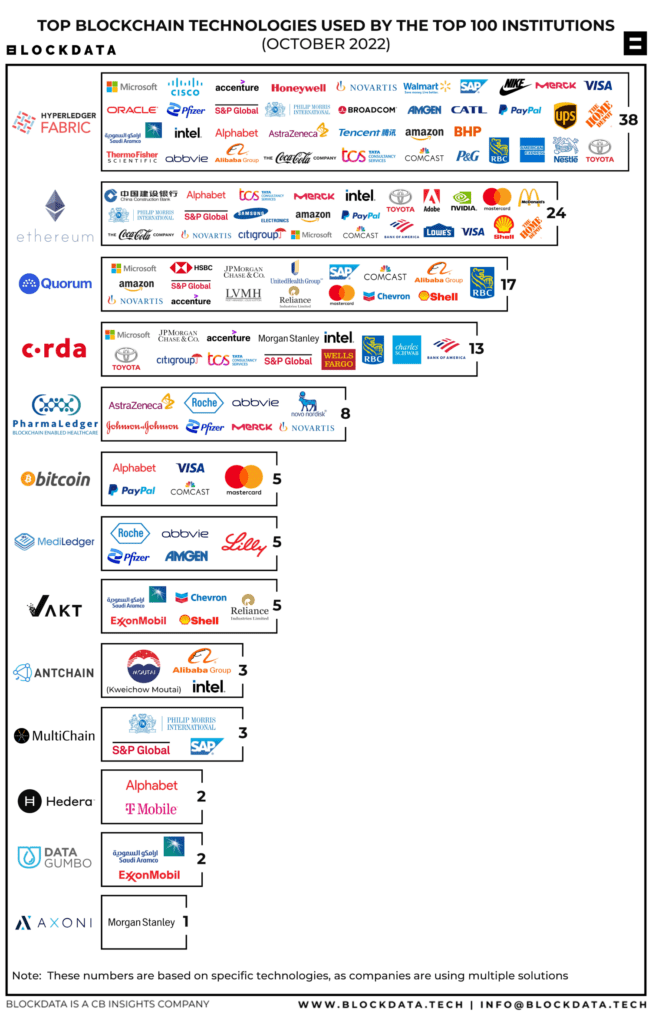A look into the adoption of blockchain solutions made by the top 100 public companies examining the use-cases and developments made in 2022.
Enterprises use a permissioned blockchain — known as an enterprise blockchain — to speed up business processes, improve transparency, and reduce costs. The private nature of enterprise blockchains makes them preferable to public blockchains, such as Bitcoin, because it restricts data visibility. Enterprises are using blockchain solutions to make their business operations more efficient.
In our last edition on enterprise blockchain in 2021, we covered the most popular enterprise blockchain solutions and technologies that the top 100 companies around the world were using. In this update for 2022, we focus on:
- The increased enterprise adoption of blockchain solutions by the top 100 companies based on market cap (as of March 2022)
- The most popular trends in the industry
- The latest news, updates, and analyses of the most popular enterprise blockchains
- Case studies featuring prominent industries and companies
Current state of enterprise blockchain
Enterprise blockchain is thriving in 2022 with more and more enterprises coming forward to invest in blockchain. It is anticipated that Investments in enterprise blockchain are expected to reach $16B by 2023, at a 5-year compound annual growth rate (CAGR) of 60.2% between 2018-2023, according to a report published by International Data Corporation (IDC).
The financial and tech, media, and telecom sectors are using the most popular technologies more than ever. Enterprises are increasingly adopting solutions backed by new iterations and wider applications, such as Hyperledger Fabric, ConsenSys’s Quorum, Ethereum, and R3’s Corda.
Our research found that distributed ledger technologies (DLTs) show impressive growth across industries, companies, and use cases. Companies are experiencing the benefits of decentralized technologies: improved security, efficiency, and cost-effectiveness.
Meta, LVMH Moet Hennessey, and Mastercard are creating their own blockchain platforms. Others, such as Pfizer and ExxonMobil, are collaborating with competitors to build industry-wide blockchain solutions.
Of the top 100 public companies, 77 are using blockchain technology. Several companies use multiple DLT solutions, including Microsoft, The Home Depot, and the Ali Baba Group. Hyperledger Fabric is the preferred solution for 38% of the top 100 companies. Ethereum follows with 24%, Quorum with 17%, R3’s Corda with 13%, and PharmaLedger with 8%.
These platforms have become more popular over the last year. In our previous update on enterprise blockchain in 2021, we found that 26% of the top 100 corporations were using Hyperledger Fabric, 18% were using Ethereum, and 11% were using Quorum.
More companies are embracing industry-specific collaborative blockchain projects, including:
- VAKT, which is used by the oil and gas industry, including ExxonMobil, Aramco, BP, Shell, Chevron, Reliance, and Total
- PharmaLedger, which is used in the pharmaceutical industry, including Pfizer, AstraZeneca, AbbVie, Novartis, Merck, GlaxoSmithKline, Janssen by Johnson & Johnson, Novo Nordisk, Bayer, and Roche
- MediLedger, which is used in the life sciences and healthcare industry, with the MediLedger network including Genentech (a division of Roche), Pfizer, Eli Lily, Amgen, Bayer, and Gilead Sciences
These blockchain solutions are useful for solving industry-specific processes, such as drug testing, supply chain management, counterfeit product elimination, and energy trading. Competitors are collaborating on blockchain projects, which will benefit the industry as a whole.
Want to see more research? Join a demo of the CB Insights platform.
If you’re already a customer, log in here.


